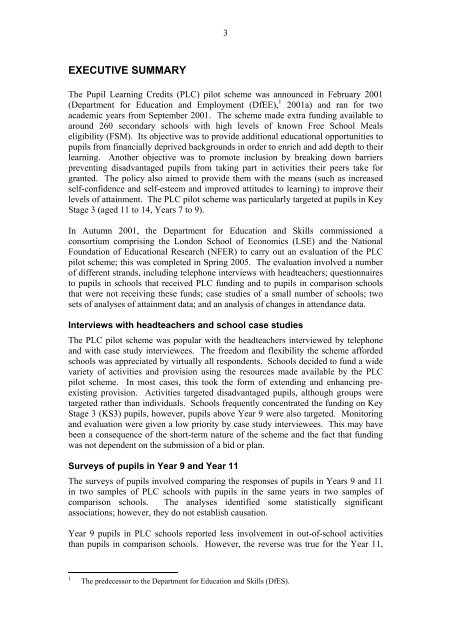Final Report of the Evaluation of the Pupil Learning Credits Pilot ...
Final Report of the Evaluation of the Pupil Learning Credits Pilot ...
Final Report of the Evaluation of the Pupil Learning Credits Pilot ...
You also want an ePaper? Increase the reach of your titles
YUMPU automatically turns print PDFs into web optimized ePapers that Google loves.
3<br />
EXECUTIVE SUMMARY<br />
The <strong>Pupil</strong> <strong>Learning</strong> <strong>Credits</strong> (PLC) pilot scheme was announced in February 2001<br />
(Department for Education and Employment (DfEE), 1 2001a) and ran for two<br />
academic years from September 2001. The scheme made extra funding available to<br />
around 260 secondary schools with high levels <strong>of</strong> known Free School Meals<br />
eligibility (FSM). Its objective was to provide additional educational opportunities to<br />
pupils from financially deprived backgrounds in order to enrich and add depth to <strong>the</strong>ir<br />
learning. Ano<strong>the</strong>r objective was to promote inclusion by breaking down barriers<br />
preventing disadvantaged pupils from taking part in activities <strong>the</strong>ir peers take for<br />
granted. The policy also aimed to provide <strong>the</strong>m with <strong>the</strong> means (such as increased<br />
self-confidence and self-esteem and improved attitudes to learning) to improve <strong>the</strong>ir<br />
levels <strong>of</strong> attainment. The PLC pilot scheme was particularly targeted at pupils in Key<br />
Stage 3 (aged 11 to 14, Years 7 to 9).<br />
In Autumn 2001, <strong>the</strong> Department for Education and Skills commissioned a<br />
consortium comprising <strong>the</strong> London School <strong>of</strong> Economics (LSE) and <strong>the</strong> National<br />
Foundation <strong>of</strong> Educational Research (NFER) to carry out an evaluation <strong>of</strong> <strong>the</strong> PLC<br />
pilot scheme; this was completed in Spring 2005. The evaluation involved a number<br />
<strong>of</strong> different strands, including telephone interviews with headteachers; questionnaires<br />
to pupils in schools that received PLC funding and to pupils in comparison schools<br />
that were not receiving <strong>the</strong>se funds; case studies <strong>of</strong> a small number <strong>of</strong> schools; two<br />
sets <strong>of</strong> analyses <strong>of</strong> attainment data; and an analysis <strong>of</strong> changes in attendance data.<br />
Interviews with headteachers and school case studies<br />
The PLC pilot scheme was popular with <strong>the</strong> headteachers interviewed by telephone<br />
and with case study interviewees. The freedom and flexibility <strong>the</strong> scheme afforded<br />
schools was appreciated by virtually all respondents. Schools decided to fund a wide<br />
variety <strong>of</strong> activities and provision using <strong>the</strong> resources made available by <strong>the</strong> PLC<br />
pilot scheme. In most cases, this took <strong>the</strong> form <strong>of</strong> extending and enhancing preexisting<br />
provision. Activities targeted disadvantaged pupils, although groups were<br />
targeted ra<strong>the</strong>r than individuals. Schools frequently concentrated <strong>the</strong> funding on Key<br />
Stage 3 (KS3) pupils, however, pupils above Year 9 were also targeted. Monitoring<br />
and evaluation were given a low priority by case study interviewees. This may have<br />
been a consequence <strong>of</strong> <strong>the</strong> short-term nature <strong>of</strong> <strong>the</strong> scheme and <strong>the</strong> fact that funding<br />
was not dependent on <strong>the</strong> submission <strong>of</strong> a bid or plan.<br />
Surveys <strong>of</strong> pupils in Year 9 and Year 11<br />
The surveys <strong>of</strong> pupils involved comparing <strong>the</strong> responses <strong>of</strong> pupils in Years 9 and 11<br />
in two samples <strong>of</strong> PLC schools with pupils in <strong>the</strong> same years in two samples <strong>of</strong><br />
comparison schools. The analyses identified some statistically significant<br />
associations; however, <strong>the</strong>y do not establish causation.<br />
Year 9 pupils in PLC schools reported less involvement in out-<strong>of</strong>-school activities<br />
than pupils in comparison schools. However, <strong>the</strong> reverse was true for <strong>the</strong> Year 11,<br />
1<br />
The predecessor to <strong>the</strong> Department for Education and Skills (DfES).

















